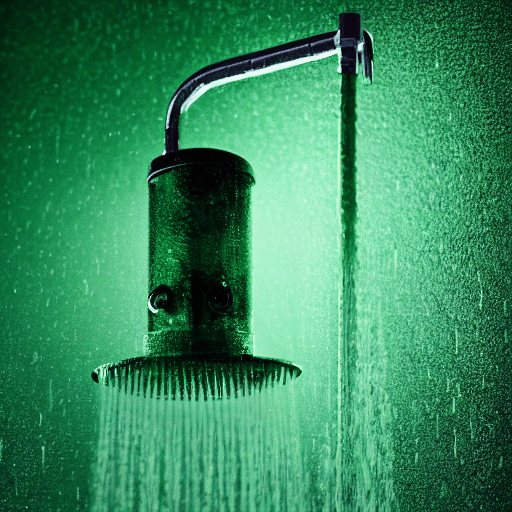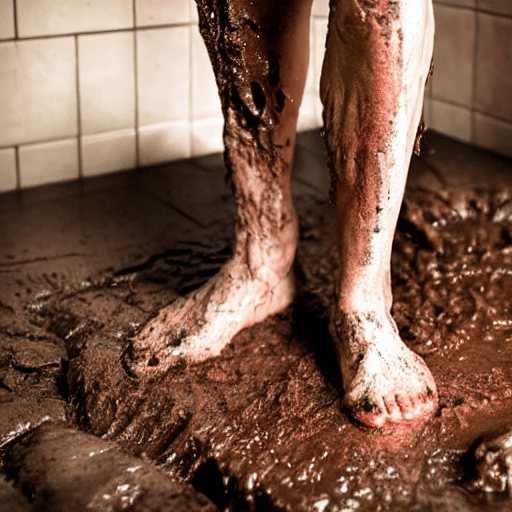While sure, exceptionally dry air and cold weather can cause your skin to feel dry, tight, and flaky, there’s another potential culprit that might be to blame: your shower water.
Your shower water is often treated with chlorine and may have a high mineral content, which can strip away the natural oils that keep your skin hydrated.
Chlorine’s Impact on Your Skin

While the chlorine found in your shower water is relatively harmless and safe for bathing, there is no denying that it can dry out your skin. If you have dry skin, you may find that your symptoms are worse after showering or bathing.
The reason for the dryness is that chlorine reduces the amount of water that the stratum corneum (outer layer of your skin) can hold (source). This can lead to several dry skin symptoms, such as itching, redness, and flaking.
While the study above researched chlorine levels less than 2.0 mg/L, typical shower water contains around 4 mg/L chlorine (source). So, it stands to reason that showering in chlorinated water can indeed cause dry skin.
Signs of Chlorine Irritation
The symptoms of chlorine irritation can vary depending on the severity of the condition. However, per the New York State Department of Health, symptoms include the following:
- Respiratory Irritation
- Wheezing
- Coughing
- Sore Throat
- Skin and Eye Irritation
- Red, itchy skin
Therefore, if you’re experiencing any of these symptoms after showering, it’s possible that your shower water is to blame.
Hard Water’s Impact on Your Skin

Like chlorine, hard water can also strip away the natural oils that keep your skin hydrated. A study published in the Journal of Investigative Dermatology found that hard water causes skin irritation and atopic dermatitis in healthy (source).
So What Are Your Options?
Luckily, you have plenty of options for mitigating the effects of shower water on your skin.
Consider the following:
Whole House Water Filtration System: These systems connect to your home’s water supply and remove chlorine and other contaminants from all the water in your home, not just the water that comes out of your shower head. This is a great option if you’re also interested in filtered drinking water. However, these systems can be costly to install and aren’t an option if you rent your home.
Shower Head Filter: Sometimes referred to as point-of-source filters, shower filters are easy to install and attach directly to your shower head to remove chlorine, heavy metals, sediment, and other particulates from the water. These filters are relatively affordable and easy to install, making them an excellent option for many. However, they are not without their limitations. Shower filters cannot remove chloramines, and they need to be replaced frequently (usually every 3-6 months). Chloramines are different than chlorine and are added to many public water supplies to control bacteria (source). While chloramines are also believed to be drying to the skin, they are not as easily filtered out as chlorine.
Body Lotion: To counteract dry, itchy skin, a moisture-rich body lotion can help to offset symptoms. Be sure to look for a lotion free of fragrances, parabens, sulfates, and other harsh chemicals. Also, consider a lotion with natural ingredients like aloe vera, shea butter, or jojoba oil to soothe and nourish your skin.
Change Your Showering Habits: Take shorter showers, use cooler water, and avoid hot tubs and pools. All these can help reduce the amount of chlorine and minerals your skin is exposed to.
Test Your Water First
Before spending any money on filtration systems or changing your showering habits, it’s a good idea to test your water. This will give you a better idea of what, exactly, is in your water and how hard it is.
There are a few different ways to test your water. You can either purchase a do-it-yourself water test kit or have your water professionally tested.
DIY test kits are extremely affordable and can be purchased online or at your local hardware store. They can test for various things, including hardness, chlorine, and pH levels.
If you’d prefer to have your water professionally tested, the EPA has a list of state-certified laboratories that can test your water.
Once you get the data back on your water, you’ll have a better idea of what, if anything, needs to be done to make your shower water more skin-friendly.
Conclusion
The water that comes out of your shower head can greatly impact how your skin looks and feels. We hope this article has helped shed some light on the subject and given you some ideas on how to combat the effects of hard water on your skin.
